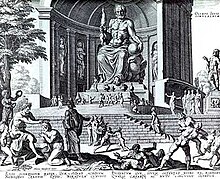User:Tdisibio/sandbox
 | This is a user sandbox of Tdisibio. A user sandbox is a subpage of the user's user page. It serves as a testing spot and page development space for the user and is not an encyclopedia article. |
- The Iliad is a poem by Homer about the Trojan war and the battle over the City of Troy. As God of the sky, lightning, thunder, law, order, justice, Zeus controlled Ancient Greece and all of the mortals and immortals living there.[1] The Iliad covers the Trojan War in which Zeus played a major part in. By controlling many of the character's fate, he was arguably the most important character in the text.
- Notable Scenes that included Zeus[2][3]
- Book 2: Zeus sends Agamemnon a dream and is able to partially control his decisions because of the effects form the dream
- Book 4: Zeus promises Hera to ultimately destroy the City of Troy at the end of the war
- Book 7: Zeus and Poseidon ruin the Achaeans fortress
- Book 8: Zeus prohibits the other Gods from fighting each other and has to reside to Mount Ida where he can think over his decision that the Greeks will lose the war
- Book 14: Zeus is seduced by Hera and becomes distracted while she helps out the Greeks
- Book 15: Zeus wakes up and realizes that Poseidon his own brother has been helping out the Greeks, while also sending Hector and Apollo to help fight for the Trojans enforcing that the City of Troy will fall
- Book 16: Zeus is upset that he could't help save Sarpedon's life because it would then contradict he previous decisions
- Book 17: Zeus is emotionally hurt for the fate of Hector
- Book 20: Zeus lets the other Gods help out their respective sides in the war
- Book 24: Zeus demand that Achilles (his son) release the corpse of Hector to be buried honorably

Zeus in other Religious Texts
[edit]- Zeus is heavily involved in the Greek Religion although that was covered in Ancient Greek Religion.
- Zeus is mentioned in the Bible which is covered in the section "Zeus in the bible".
- In the Torah, the common myth that the word Jesus was derived from the word Zeus in Hebrew was proven to be untrue. The only reason that a connection could be drawn between the two is that in Hebrew the two word sound similar and therefore could have led people to believe this myth is true. It is widespread knowledge that the word Jesus comes from the glottal-chronological history from Hebrew. [4]
- In the Quran and Tipitaka, Zeus is not mentioned at all, although the "Great Flood" supposedly caused by Zeus is briefly mentioned. The usage of floods in all religious texts are a recurring theme[5]

Zeus's Notable Conflicts
[edit]- The most notable conflict in Zeus' history was his struggle for power. Zeus' parents Cronus and Rhea (mythology) ruled the Ancient World after taking control from Ouranos, Cronus's father. When Cronus realized that he wanted power for the rest of time he started to eat his children, Hestia, Demeter, Hera, Hades, and Poseidon. When Rhea realized what was going on, she quickly saved their youngest child, Zeus. Having escaped death, Zeus was spared because of the swiftness of Rhea tricking Cronus into thinking she consumed Zeus. She wrapped a stone in a blanket, and Cronus swallowed it thinking he was swallowing his last child.[6] As a result of this, Zeus was shipped off to live on the island of Crete. He was raised by the goddess of the earth, Gaia.
- When Zeus was atop Mount Olympus he grew upset with mankind and the sacrifices they were performing on one another. Furiously, he decided it would be smart to wipe out mankind with a gigantic flood using the help of us brother Poseidon, King of the Seas. Killing every human except Deucalion and Pyrrah, Zeus flooded the entire planet but then realized he then had to restore society with new people. After clearing all the water, he had Deucalion and Pyrrah create humans to repopulate the earth using stones that became humans. These stones represented the "hardness" of mankind and the man life. This story has been told different ways and in different time periods between Ancient Greek Mythology and The Bible, although the base of the story remains true.[7]
- Throughout history Zeus has used violence to get his way, or even terrorize humans. As God of the sky he has the power to hurl lightning bolts as his weapon of choice. Since lightning is quite powerful and sometimes deadly, it is a bold sign when lightning strikes because it is known that Zeus most likely threw the bolt.[8]
- ^ "Zeus • Facts and Information on Greek God of the Sky Zeus". Greek Gods & Goddesses. Retrieved 2015-11-30.
- ^ "The Gods in the Iliad". department.monm.edu. Retrieved 2015-12-02.
- ^ Homer (1990). The Iliad. South Africa: Penguin Classics.
- ^ "Is the Name of Jesus Derived from the Name Zeus?". www.torahtimes.org. Retrieved 2015-11-30.
- ^ "The great Flood: the Quran". www.livius.org. Retrieved 2015-12-02.
- ^ "Zeus". Ancient History Encyclopedia. Retrieved 2015-11-30.
- ^ "Greek Gods". AllAboutHistory.org. Retrieved 2015-12-02.
- ^ "Zeus • Facts and Information on Greek God of the Sky Zeus". Greek Gods & Goddesses. Retrieved 2015-12-02.
